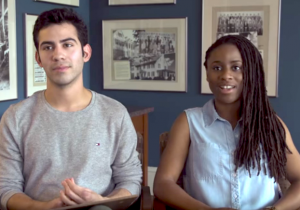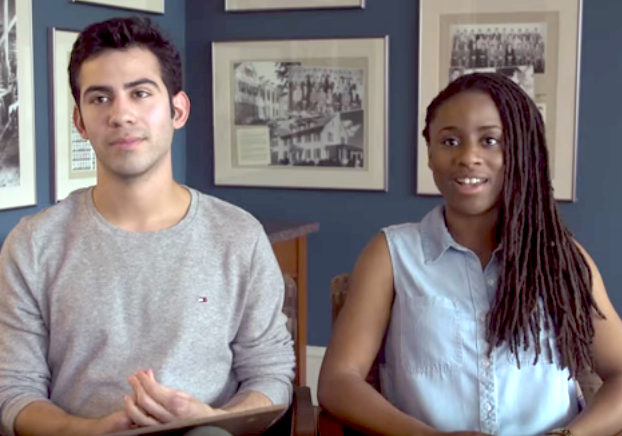Diego Guevara and Daraja Hinds

- Hometown: Central Falls and Pawtucket, Rhode Island
- Majors: Theatre
- Graduation Year: 2016
Graduating seniors Diego Guevara and Daraja Hinds spent countless hours during their years in the University of Rhode Island Theatre Department honing their craft.
They learned acting techniques, production design and had the opportunity to perform as numerous characters in front of live audiences.
But as they prepare to participate in Commencement on May 22, Hinds and Guevara will take not just the lessons learned in the classrooms and stages of the Kingston Campus, they will take along life experiences that will help them embody new characters and give convincing performances in their careers as actors.
While actors are often able to draw upon their own experiences to find a way to convincingly portray a character, sometimes a character’s motivations lie too far from anything the actor has experienced. For those parts, Hinds and Guevara have found ways to draw inspiration from their work with others, outside of theater.
Guevara, for instance, had to erase his perpetual smile and tuck away his charm to embody the ruthless teenage killer Eric Harris, who – along with Dylan Klebold – perpetrated the Columbine massacre in 1999. Guevara played the part of Freak, based on Harris, in the Theatre Department’s production of “columbinus.”
“He’s a scary guy and getting there, inside his head, was scary,” Guevara said. “But he’s human. He had human experiences. He’s not just some monster. I had to make him more human than I think the audience expected.”
To do that, Guevara, a resident of Central Falls, had to draw upon not only his own high school experiences, which were vastly different than Eric Harris’, but also on his observations of people he’s met throughout his life. Guevara has taken part in mission trips to his father’s native country of Nicaragua, where he helped build four homes for needy families. He has worked with the URI SNAP Outreach Project, which works to improve access to the nutrition program for those who need it.
“Working with the SNAP Outreach Program was incredibly important for me,” Guevara said. “It not only helped me grow as a person, it helped my acting as well. I got the chance to work with people who I might not generally be around and it helped me understand who they are and where they come from.
“It really helped me with ‘columbinus,’” he said. “That experience showed me there’s so much more to a person than what they present to the world. I had my own picture of Harris in my head before I began preparing for the play, and my work with the SNAP Outreach Program made me realize I had to try to find the person inside the monster.”
Hinds, too, took advantage of her work on campus to improve her acting. A resident of Pawtucket, Hinds spent two years working as a resident assistant in Hutchinson Hall, a freshman dormitory.
“I learned so much about people,” she said. “Two students can come in for the same undesirable behavior and you have to guide them in different ways. You have to get to know them and how they work. You can’t just judge them based on what they do or say. You have to find out where they’re coming from and know that people carry around so much baggage that you may not be aware of. I think that experience of getting to know these students and their motivations – for good behavior or otherwise – will help me in the long run with my acting.”
Hinds has already leaned on that experience, most recently when she portrayed Pilar, a Delta Nu sorority sister in URI’s musical production of “Legally Blonde.”
“I’m very far removed from that character,” Hinds said, laughing. “She’s very flamboyant and out there, this rich girl from California who believes that money can solve all problems. But those people are still people and you have to get into their heads to understand their motivations and desires. My time as an RA definitely helped me get into this character better.”
Both Hinds and Guevara hope these lessons will translate into more roles in bigger and better productions as they seek to make acting their careers.
Guevara, who has also acted in some independent films, said he’ll continue taking classes after graduation while he auditions for parts in Rhode Island, Boston and New York. Film, he said, was his first connection to acting and, ideally, he’d like to work in television or film.
“Theater is so much fun because you get the immediate gratification of the audience,” he said. “With film, you have to wait until the premiere to know if people liked your work. However, film gives you more of a chance to create and really inhabit a character.”
Hinds, too, is open to working in television or film, but will mostly concentrate on her theater work after graduation. The Phi Eta Sigma Honor Society student said she’ll continue auditioning and trying to build her resume to be taken seriously by casting directors in the bigger markets such as New York.
She intends to move to Washington D.C., which has a vibrant theater scene, and continue to apply all the lessons she’s learned at URI – not just the lessons about acting techniques.
“The professors here in this program have always stressed that they can give us the skills and techniques, but you have to find your niche and what you really like,” she said. “So that’s what I want to do when I get out of school. I want to see as much as I can and figure out where I belong in the world.”
Media Contact: Brian Pernicone, 401-874-7245

